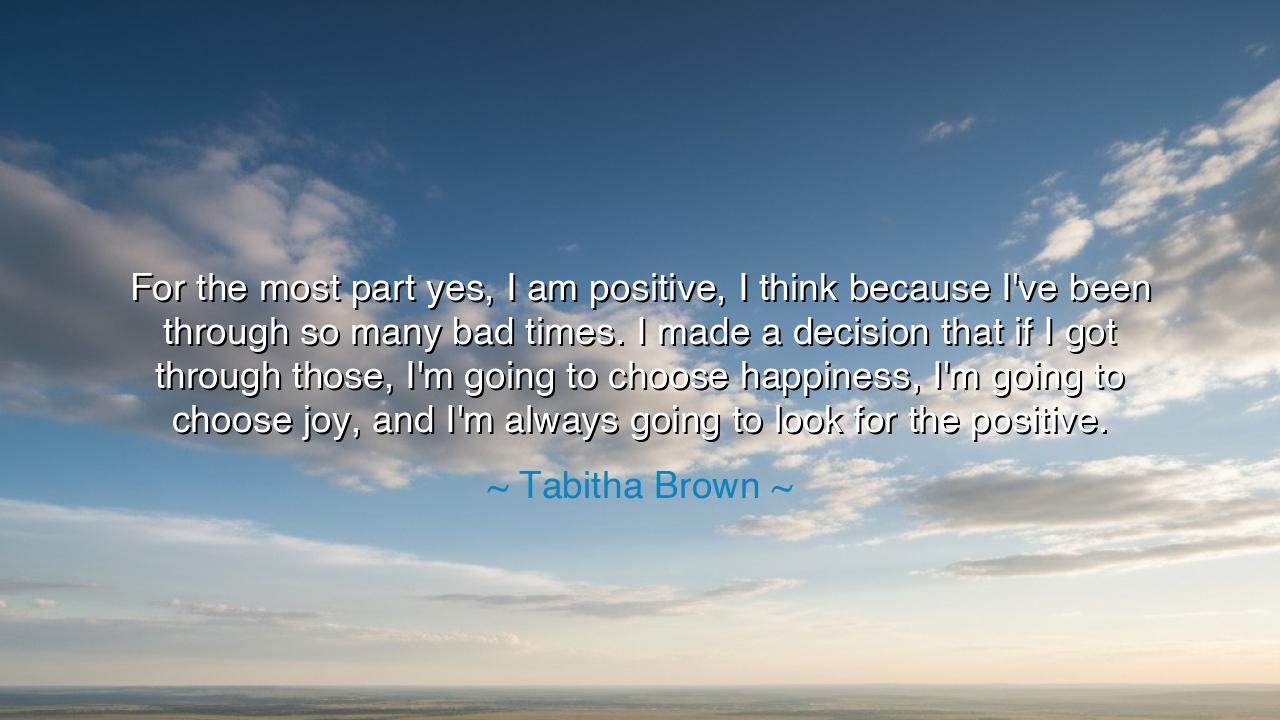
For the most part yes, I am positive, I think because I've been
For the most part yes, I am positive, I think because I've been through so many bad times. I made a decision that if I got through those, I'm going to choose happiness, I'm going to choose joy, and I'm always going to look for the positive.






“For the most part yes, I am positive, I think because I've been through so many bad times. I made a decision that if I got through those, I'm going to choose happiness, I'm going to choose joy, and I'm always going to look for the positive.” — Tabitha Brown
In these radiant and soulful words, Tabitha Brown, the beloved voice of comfort and light, speaks a truth older than sorrow itself — that happiness is not found, but chosen. Her words are not naïve optimism, but the declaration of a soul tempered by fire. She does not say she was born joyful; she says she decided to be. For those who have walked through darkness and survived, there comes a moment of sacred clarity — the understanding that pain can either harden the heart or awaken it. Brown chose awakening. She reminds us that positivity is not a denial of suffering, but a triumph over it.
The origin of this quote lies not in ease, but in endurance. Tabitha Brown’s journey was marked by struggle — illness, rejection, uncertainty. She faced years of hardship before her voice reached the world. Yet, from the ashes of her trials, she forged a spirit of gratitude and gentleness that now uplifts millions. Her declaration — “I’m going to choose happiness” — carries the weight of one who knows despair and has overcome it. In her life, we see reflected the ancient truth: that suffering, when met with courage, becomes the teacher of peace.
The ancients too knew this wisdom. The Stoic philosophers taught that while we cannot control what the world brings to our door, we can control the spirit in which we greet it. Epictetus, once a slave, said that a man’s freedom lies not in his circumstances, but in his choices. And the Buddha, long before him, taught that pain is inevitable, but suffering is optional — that one may endure hardship and yet remain inwardly serene by choosing compassion and joy. In this lineage of wisdom, Tabitha Brown stands as a modern voice of ancient strength.
To choose joy after pain is the highest act of rebellion against despair. It is to tell the universe, “You did not break me — you built me.” This choice is not born from ignorance, but from understanding. For only those who have felt the weight of sorrow know how precious light truly is. Each day that Brown chooses happiness, she performs a quiet act of courage — a revolution of the heart. And in doing so, she invites us to do the same: to turn our pain into power, our scars into reminders of our own endurance.
Consider the life of Nelson Mandela, who spent twenty-seven years in prison and yet emerged without bitterness. “I never lose,” he said. “I either win or learn.” His words echo the spirit of Tabitha Brown’s — both speak of a decision to see beyond suffering, to claim joy as an act of will. Mandela’s freedom began long before his release, for he chose to be free in his heart. So too does Brown teach that happiness is not a condition of circumstance, but a state of being born from perspective and faith.
Yet this choice is not made once, but daily. To look for the positive is to cultivate the eyes of gratitude, to seek beauty even in the cracks of life’s foundation. It is a discipline, like tending a garden in stony soil. Each morning, we must decide: shall we water the weeds of resentment, or the flowers of joy? Brown’s message is both gentle and commanding — that peace is not accidental, but practiced; that positivity, like strength, must be exercised through every trial and tear.
So let this truth be passed down, O listener: You have the power to choose joy. Life will bring its storms — that much is certain. But within you lies the power to face them with light. When pain comes, do not surrender to it; transform it. When darkness falls, look for the stars that suffering reveals. For every hardship you endure gives you another reason to shine. As Tabitha Brown teaches, happiness is not a reward at the end of the journey — it is the path itself, chosen each day by those brave enough to love life despite its pain. Choose joy, and you will teach the world what it means to truly live.






AAdministratorAdministrator
Welcome, honored guests. Please leave a comment, we will respond soon